How to Start a Clothing Boutique (And Make $102K/Month)
November 5, 2021
November 5, 2021

Have you ever wondered how to start a boutique business?
Lee Smith started Urbanity in 2009 after traveling to New York City and realizing that Bellevue, Washington didn’t have a clothing store where you could go to select full outfits of designer clothing and accessories in one place.
Today it’s making over $1,000,000 a year.
We’re going to walk you through the process of starting your own boutique and share advice from Lee throughout. If you’re ready to join a group of successful small business owners making more than $1,000,000 annually, keep reading!
If you are thinking about starting an eCommerce business and staying up to date on current fashion trends, you should consider starting an online boutique.
The boutique sells everything you need to make an outfit complete. This is a niche market of the clothing industry.
To properly start a boutique, the boutique owner should have styles that work together to create an outfit. This includes brand name:
Make sure to sell accessories because they are typically high-profit items and easy upselling opportunities.
Before we start looking into the logistics of starting a new business, let’s consider some of the aspects that may impact whether you want to start a clothing boutique.
When you are starting any business, you should consider the following things:

It’s important to know what business model will work best for your own boutique. There are many different models to choose from.
The most common business models are:
For new business owners, it may be difficult to start a clothing store with a physical location due to the additional costs involved with a physical location.
Lee told us:
If you have the funds to rent a space in a high-traffic shopping area, starting a boutique with a physical shop can be beneficial because the location introduces you to prospective customers.
Lee also told us:
Check out our interview with Lee from Urbanity below.
An online boutique uses an eCommerce platform such as our partner Shopify to sell clothing.
It’s far easier to start a successful online boutique because your online store can be seen anywhere in the world for a much lower cost than starting a successful clothing boutique with a retail location.
When you start an online boutique, you may be able to benefit from reduced starting costs by using dropshipping options that are easily available via Shopify, like Printful or Oberlo.
An online business also reduces or eliminates the costs of a physical location.
While a small business will see cost-saving benefits when you start an online boutique, the small business owner will also see some increased costs compared to retail spaces.
You should expect higher business expenses around:
While new boutique owners may not be able to start a retail boutique early in their journey of starting a fashion business, the ones that can afford to will benefit more from having both your own store and an eCommerce website.
As Lee pointed out, there are some items that he can only sell at the store location.
In addition, clothing stores will increase their revenue from their existing customer base, while an eCommerce website will increase brand awareness by having a physical location.
The largest online boutiques include some major players.
You’ve got major Chinese retailers like JD.com and VIP.com with revenues of over $10B per year.
Then you’ve got some of the US retailers, like Macy’s and Kohl’s that, make over $5B/year, but here are some of the largest revenues that are only boutiques:
All revenues are based on eCommerceDB for 2020 online fashion sales unless noted otherwise.
Small Players (the opportunity)
Everything points to retail sales going more and more to online sales. In fact, Tech Crunch expects 2022 to be the first year that eCommerce sales in the US hit $1T.
According to a Presearch about the “percentage of clothing sales online,” online store sales are increasing by 3-4% every year.
However, they are currently less than 30% of the $369 Billion dollars that Statista attributes to the US apparel and footwear sales.
That means you can expect a successful online boutique to benefit both from the increasing trend of retail sales going online and the increasing sales from people spending more money since most places have abandoned Covid restrictions.
Because of the growth in the industry and the move to online sales, people should expect higher revenue, more competition, lots of new entrants, and increased marketing spending.

There is a ton of work that has to be done before opening a boutique. Whether you are wondering how to start a boutique from home, online, or opening your own retail location, you’ll need to consider the following:
We created a checklist for you to follow if you proceed with starting an online boutique. Download our starting an online boutique checklist here.
You need a business plan for your boutique. A business plan helps you define your vision while starting a boutique.
Small businesses should use the plan to refine their business idea, guide decisions, secure financing, and develop partnerships with other businesses.
Boutique owners should have a flexible business plan so their process can evolve as their online boutique grows and fashion trends change.
Here are some resources to help with this step.
We’ve gathered templates to help you develop your business plan. Here are some of the best:
It gets better! Here’s some free and low-cost education on business plans:
I’d also suggest checking out our interview with Mike Andes on how to write a business plan below.
When you’re a small business owner, it can be a challenge, but you have to figure out how to get inventory for your online boutique. Do NOT buy clothes from local department stores — you may want to consider wholesalers online.
Wholesalers are retailers who sell clothing in bulk at wholesale. Price and quantity requirements to buy from a wholesaler are much less than buying from manufacturers.
These types of companies are perfect for boutiques looking for affordable inventory without sacrificing quality or style options.
Let’s get even more specific about where to buy boutique clothing. Here are some ideas:
These are just some of the solutions for where to buy clothes to start a boutique.
The cost of starting a boutique can vary dramatically based on your location, target market, and whether you are starting an online boutique or retail shop.
Online boutiques can be started for as little as $1,000 assuming you use dropshipping, an eCommerce platform, and free social media platforms to target customers.
When you are opening a retail store, you can expect it to cost at least $50,000 to start a boutique. Talk to other boutique owners in your area to get an idea of how much money they invested in their space.
If your boutique ideas involve creating your own product lines, you can expect to spend $10K-$100K per product between design, manufacturing, inventory, ordering SKUs, and more.
As I mentioned previously, if you want to know how to start your own boutique without money, you’ll need to start an online boutique. I would use the following solutions:
That’s how to start an online boutique with no money. Alternatively, we’ll discuss other ways to start with no money in the funding section. Keep reading for funding options.

Common funding paths include:
The SBA offers free courses on financing options and funding programs. For info on using personal funds to start a business, check out this article from The Hartford.
Alternative sources of funding include:
I can’t really tell you much about this as it’s just a Facebook ad I have seen, but if your boutique has a recurring revenue stream (for instance, a new outfit each month) there are companies that will basically buy your future sales revenue at net current value.
This might be something to look into if you are an insurance agent who receives payments each time someone renews their policy.
Lee says:
He also says that a smaller brand name will tend to allow you more profit margin if they really want to get into your boutique. If a brand can get new customers, you can make way more profit from their products.
You’ll need to decide on a business name for your boutique. The elements of a good business name include the following:
Try the business name generator from SquadHelp.
You can buy domain names from a ton of places.
You can normally buy them directly from the platform you set up your online store on, but if you want to spend money on it elsewhere, you can find domain names for as low as $0.88 at NameCheap.
Other providers include:
You can’t learn how to start a clothing boutique without learning about the legal requirements. We’re about to discuss that next. Keep reading.

You’ve created a name and business plan. It’s time to establish the legal structure. For best results, hire legal representation that has experience starting a business, like an attorney, accountant, or tax specialist.
They’ll help you get your business started quickly so you can focus on opening your own boutique.
Each location has different licenses, permits, or tax forms required. Use the SBA License and Permits page to identify what your boutique needs. Keep reading for information on different legal structures.
A sole proprietorship is the easiest way to start a clothing boutique, but the structure doesn’t protect the owner’s assets from legal issues.
That means if something goes wrong, you could lose both your boutique and your home.
This structure should only be used if you can’t afford an LLC because the boutique includes work and materials that can cause injuries to employees or customers.
To start a sole proprietorship, fill out a special tax form called a Schedule C. Sole proprietors can also join the American Independent Business Alliance.
An LLC is the most common business structure used in the United States because the company protects the owner’s assets.
It’s similar to partnerships and corporations but can be a single-member LLC in most states. An LLC requires a document called an operating agreement.
Each state has different requirements. Here’s a link to find your state’s requirements.
People may register in specific states due to the cost of doing business. Delaware and Nevada are common states to file an LLC because of their business-friendly laws.
Here’s a blog on the top 10 states to get an LLC.
Partnerships and corporations are typically for massive organizations or legal firms. Unless there is a specific reason you need a partnership, it is better to do a multi-person LLC.
Investopedia has good information about partnerships and corporations.
Every business operating in the United States needs an employer identification number.
It’s like a social security number for your business. Apply for it on the IRS website. It’s used on tax forms when filing taxes and to tie employees’ pay to the proper employer.

Most states have a sales tax, and you need to adhere to their requirements. This blog isn’t the place to discuss the permits for all 50 states, but Avalara has a guide on Sales Taxes. Check it out.
While you are learning about sales taxes, consider using AvaTax with Shopify Plus to make your tax compliance super easy.
Federal and state tax filing requirements apply to new employers.
You must keep records of employment taxes for at least four years, including special forms and accounting for state taxes.
Don’t worry! We’ve got you covered! Check out the IRS guide for employers.
All employers must display Workplace Posters, which you can download from the website.
Other requirements include:
The U.S. Chamber of Commerce has a ton of information on unemployment and also offers links to each state agency that handles state unemployment.
You’ll have to pay $420 per employee on a federal level plus any state UI.
Now that you are familiar with the aspects of starting a boutique, let’s look at some of the things you’ll need to do before your online store is ready to launch.
Every online store needs a website to sell its products online and have full control of the layout, content, and customer data.
A boutique online store differs from other websites because it handles the sale of products, which means you’ll have some special requirements when starting a boutique business.
The primary differences between an online store and other sites will be some of the pages, including:

Product pages are dedicated to selling a specific product online.
Customers expect certain information from a product page. Anyone who wants to sell products to their customer base should follow these best practices:
Modeling your pages after Amazon’s pages makes a lot of sense because potential customers are familiar with their layouts. Check out Amazon’s Quick Style Guide for more information.
An online store has a lot of features that other websites might not.
Given most boutique businesses sell on multiple platforms, there are elaborate backends that help manage your business. The most common services to run a boutique online store on are:
I’ve used most of these at different times. I personally prefer Shopify because I find its interface easier than the others, but most have either a completely free version or a free trial.
Make sure to integrate the backend with popular sales channels like Amazon, Instagram, and Facebook.
The downside of Shopify is it uses a proprietary code called Liquid that you’ll need to familiarize yourself with if you want to do extensive search engine optimization or custom coding.
This limits the number of developers who can help you.
If you are going to build your store yourself, I would recommend looking at each of them to see which you find least difficult to use.
Check out our blog How to Create a Website (in 9 Simple Steps) for a more in-depth look at how to build a website.
According to Magneto, e-Commerce is the most vulnerable industry to cyber attacks. That’s no surprise given how easy it is to start an e-commerce business.
To best protect your brand and customers, it’s a good idea to review and implement internet best practices as outlined in SOC2 requirements or ISO 27001.
While meeting cyber security issues is complex, they will help protect your sales and customers to reduce the chances of a cyber-attack.
If you’re still not confident that you can protect the brand name with technology, talk to your insurance agent about cybersecurity insurance.
Payment processors are responsible for collecting payments from your customers.
The majority of website payment processing is through PayPal. Other payment processors include:
All of them include similar features and pricing. If your store has the option to integrate with them, offering the payment options your target customers want can increase sales dramatically.
Shopify allows multiple integrations fairly easily.
To launch your clothing boutique successfully will require different strategies based on your ideal customer.
Lee told us:
Another strategy he used was creating flyers and paying someone to hand them out.
Other strategies that have success:

Marketing is the trick to growing a business. You have to get your business and products in front of people to sell them.
Marketing should be considered in all parts of the business. Some of the most important aspects of marketing include:
Keep reading for more information on marketing.
Market research is simply identifying the amount of demand for the products or services the business offers.
In our blog How to Start a Business: The Ultimate Guide (2021), Mike Andes goes into great detail about market research, including identifying potential customers, target markets, and demographics.
The following is a summary of the points in that blog, but I’d strongly suggest reading it as well.
You can identify your ideal customers through Facebook surveys, but Lee makes an argument that in the fashion industry, you need to be your own customer. He told us:
In the fashion industry, I’d look at the characteristics and interests of you and your friends, then take note of them. We’ll talk more about this in the next section.
Here’s another great interview we’ve done with Rio Estolas from Throwback NW:
Demographics are statistical characteristics of a population or a subset of the population. Some considerations you’ll want to make are:
Psychographics are behavioral characteristics like things you like to do, what you value most and other opinions. These can be helpful as they can help a boutique recognize the best places to reach their demographic.
An example of a fairly obvious psychographic for boutiques would be that people who shop for clothes multiple times a week at the mall would suggest you should have a store in the mall, while someone who shops for clothes at Walmart once a year is not someone you are targeting.
You know the type of people your boutique should be attempting to attract, but how do you define them?
Facebook has mastered defining your target audience.
Wordstream published an infographic with all of Facebook’s targeting options that I would suggest using to specify the exact characteristics of your target audience.
If you use paid advertising, you’ll use this profile to market your boutique.

When writing the business plan, you should have written a marketing plan. Make sure to use it. As you learn which strategies are working and which aren’t, you’ll need to adjust the plan.
Make sure to include what strategies you want to test, what you consider a success, and what you consider a failure.
You should also define what percent of the budget should go to each initially and a point where you should cut off the funds to that channel of marketing.
Most clothing boutiques are going to use social media for most of their marketing. Each social media platform has a different business purpose and target market.
Let’s talk about a few of the main platforms and what makes them unique:
It’s important to first define your goal/objective so that you don’t waste time and money on the wrong platform:
Lee recommends using Instagram, and he told us:
If you are going to do paid ads, I would highly recommend reading this Oberlo blog about lessons learned from spending $20k on Facebook ads.
Email lists are a great way to remind your customers about your business. Most businesses collect emails by offering something for free.
For a boutique clothing company, I would recommend offering either a discount or the first item in a subscription for free.
Once you’ve collected their data, you can use it to let them know about sales, remind them about abandoned carts, or let them know when a new product line is released.
Lee told us:
Don’t be afraid to ask them for advice. Many of them probably have their own website
Running the boutique is what you will spend most of your time doing. This includes aspects like hiring employees, helping customers, keeping inventory in stock, accounting, and payroll.

Hiring employees is primarily focused on hiring people who represent the brand well. Lee told us:
When hiring employees for a boutique, you’ll be required to:
Keep reading for more info on each step.
Hiring people requires posting “now hiring” signs and posting on prominent job boards. Some places you can start posting job requirements are:
Having a prepared list of questions for interviews can make hiring the right people easier.
Indeed offers a variety of resources to help you make better hiring decisions. Read their guide on how to hire your first employee.
Some questions you should ask during the interview process include:
Employees are typically a company’s biggest expense. There are three common pay structures in business.
Each fits different scenarios. Let’s take a closer look.
Flat weekly/monthly rate based on a person working a specific number of hours.
This is typically reserved for owners, managers, and some admin roles. You might want to assign this to yourself for budgeting purposes.
This pay structure just tracks the hours an employee works and pays them a set hourly rate. This pay structure is solely based on time, not performance.

Typically used in sales to give employees a percentage of revenue. It is a strictly performance-based compensation model.
Hybrid models combine two pay structures: for instance hourly and commission to compensate for time and performance.
The hourly rate will typically be lower than an hourly rate without commission, but the commission should make it where good performing employees make more than they would without commission.
These structures also help reduce the variability of pay from week to week.
Paying employees an hourly wage works for most positions for clothing lines, but depending on your business structure, a commission or hybrid payment model might make sense.
The article, “How to Create a Pay Structure That Promotes Team and Company Growth” offers some insights into thinking about pay structure.
If you don’t need a full-time employee, you can consider outsourcing or hiring a freelancer on sites like Upwork.com.
You may pay more per unit hour, but it saves you time in hiring, training, and other time-consuming activities.
Accounting and payroll are often prime targets for outsourcing because they can be done remotely on a weekly or biweekly basis.
Federal and state tax filing requirements apply to new employers. You must keep records of employment taxes for at least four years, including special forms and accounting for state taxes.
Don’t worry! We’ve got you covered! Check out the IRS guide for employers.
Lee told us:
All employers must display Workplace Posters, which you can download from the website.
Other requirements include:

Retaining customers is primarily about customer service and making it easy for them to interact with you via methods they are comfortable with.
Lee suggests spending a lot of time in the stores.
If you are running an online boutique, you should be thinking about aspects of the user experience like:
Lee told us:
He uses Lightspeed, which costs $150/month, but he doesn’t love it.
Lightspeed is an all-in-one payment sales platform, payment processor, and inventory system. He suggests looking for better ones. He told us:

We’ve given you all the knowledge and tools you need to start your own boutique. Make sure you focus on a style you are passionate about.
We’d love to hear about your journey to starting an online boutique. If you’d like to tell your story or have tools you’d really love to share, leave us a comment below.
We love hearing about strategies that work for you.
Brandon Boushy
 That means there are at least 10 different types of consultants for each industry segment in the NAICS. If you are an expert in something, chances are you can start a consulting business.
That means there are at least 10 different types of consultants for each industry segment in the NAICS. If you are an expert in something, chances are you can start a consulting business.
 A consulting firm is a natural progression from a productized model. Consulting firms focus on having a team of consultants that can help clients achieve their goals. You might see this consulting business model in major accounting firms, tech companies, and more mature consulting businesses.
These firms will be focused on getting as many potential clients as possible. Because they have other consultants to give expert advice, they are not limited by the constraints of a solo consultant.
A business owner who starts a consulting firm will be more focused on managing people than serving clients. Their earnings will be based on how well employees provide results for their clients.
A consulting firm is a natural progression from a productized model. Consulting firms focus on having a team of consultants that can help clients achieve their goals. You might see this consulting business model in major accounting firms, tech companies, and more mature consulting businesses.
These firms will be focused on getting as many potential clients as possible. Because they have other consultants to give expert advice, they are not limited by the constraints of a solo consultant.
A business owner who starts a consulting firm will be more focused on managing people than serving clients. Their earnings will be based on how well employees provide results for their clients.
 Small Players: You don’t have to be a multi-billion dollar corporation to make a great living. We’ve interviewed marketing consulting companies and brand consultants. Check out some of the other consultants with whom we have met:
Small Players: You don’t have to be a multi-billion dollar corporation to make a great living. We’ve interviewed marketing consulting companies and brand consultants. Check out some of the other consultants with whom we have met:
 NameCheap offers domains, sometimes for less than a dollar. You can also find domains from any web builder or:
Get ready to hear about legal requirements for consulting companies.
NameCheap offers domains, sometimes for less than a dollar. You can also find domains from any web builder or:
Get ready to hear about legal requirements for consulting companies.
 LLCs are common in the United States because of the liability protection. Each state has different requirements to get an LLC. Find your state’s requirements.
Many business owners will opt to have their LLC file as an S-Corp with the IRS. To learn more check out our blog LLC vs S-Corp.
Stay with us for additional business structure styles consultants might use.
LLCs are common in the United States because of the liability protection. Each state has different requirements to get an LLC. Find your state’s requirements.
Many business owners will opt to have their LLC file as an S-Corp with the IRS. To learn more check out our blog LLC vs S-Corp.
Stay with us for additional business structure styles consultants might use.
 You’ll need to file taxes and withhold payroll for employees.
The IRS guide for employers provides guidance on payroll.
You’ll need to file taxes and withhold payroll for employees.
The IRS guide for employers provides guidance on payroll.
 Market research is about identifying the demand for your consulting services. This includes:
Market research is about identifying the demand for your consulting services. This includes:
 Marketing plans can be simple or elaborate, but they should be focused on providing your customers something of value. Ryan told us this is basically his marketing plan:
Marketing plans can be simple or elaborate, but they should be focused on providing your customers something of value. Ryan told us this is basically his marketing plan:
 Email lists are some of the most powerful marketing tools to reach potential clients. You can use them to remind people about changes in the industry, promotions, and other information that can help your customers.
I’d suggest following MailChimp’s blog to develop your mailing list.
Email lists are some of the most powerful marketing tools to reach potential clients. You can use them to remind people about changes in the industry, promotions, and other information that can help your customers.
I’d suggest following MailChimp’s blog to develop your mailing list.
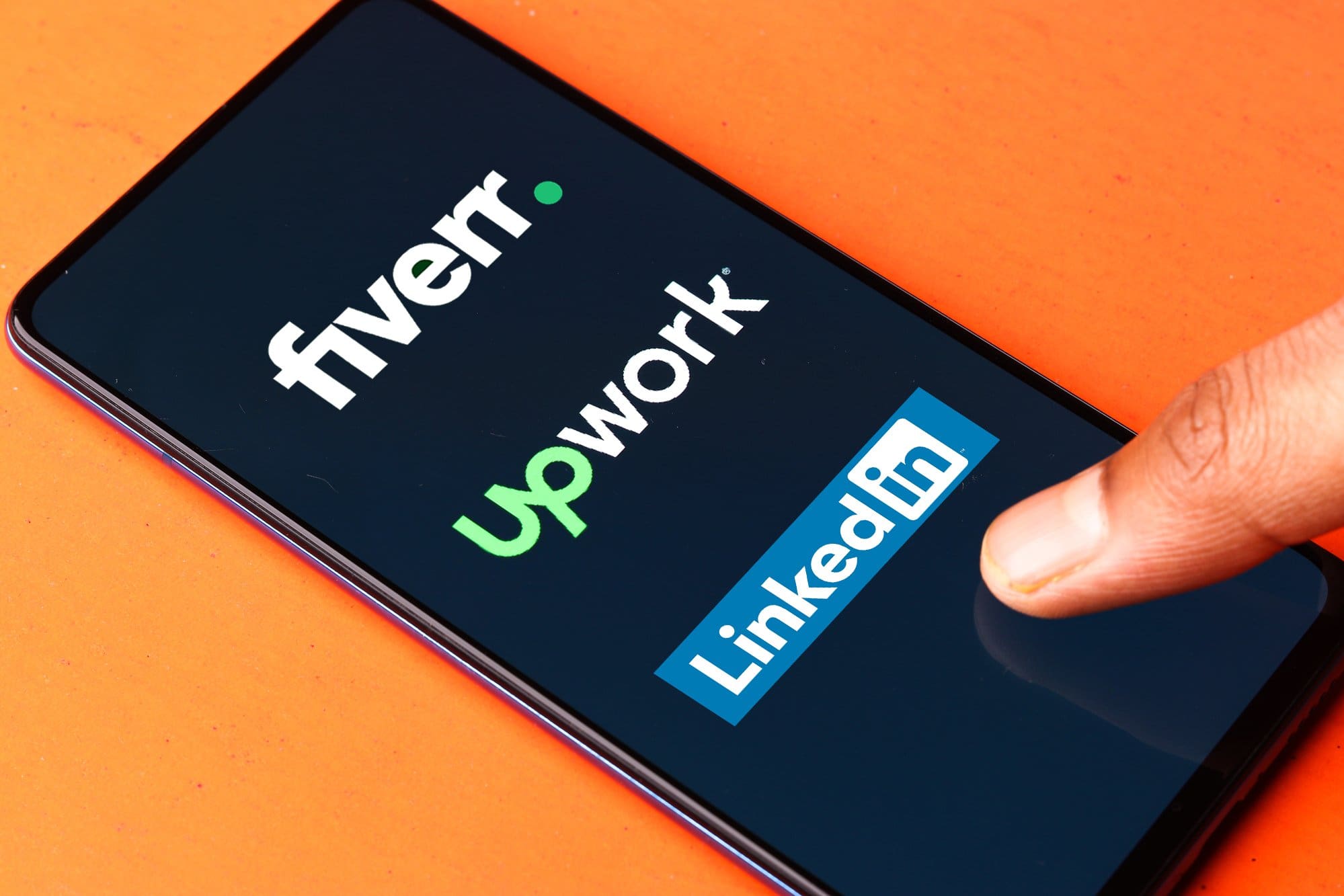 A good consultant will probably want to hire people and agencies to assist with client projects on a project-by-project basis. This means businesses in the consulting field should find employees on sites like:
A good consultant will probably want to hire people and agencies to assist with client projects on a project-by-project basis. This means businesses in the consulting field should find employees on sites like:
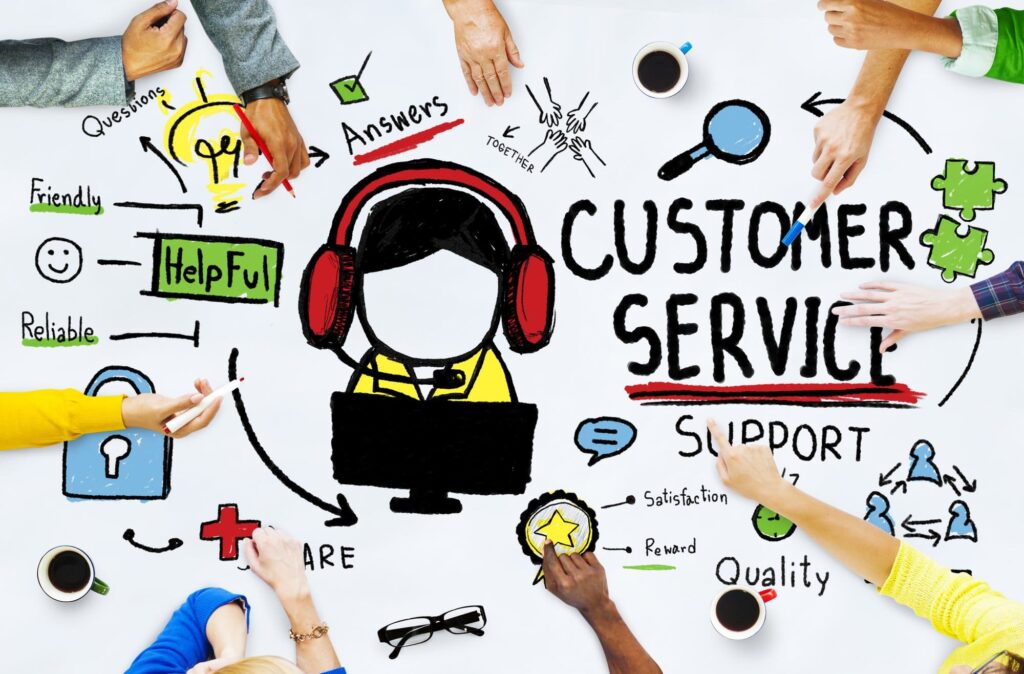 “Reputation! Reputation! Reputation!”
Keeping customers happy is about providing a service that improves their bottom line. That means, with everything you do, you need to consider how it’s going to make their business more profitable.
In human resources consulting there are always ways to improve retention rates, lower the cost of recruiting, and other aspects that industries hire consultants to help develop.
Meanwhile, a consultant in supply chain management might create a career consulting businesses on:
“Reputation! Reputation! Reputation!”
Keeping customers happy is about providing a service that improves their bottom line. That means, with everything you do, you need to consider how it’s going to make their business more profitable.
In human resources consulting there are always ways to improve retention rates, lower the cost of recruiting, and other aspects that industries hire consultants to help develop.
Meanwhile, a consultant in supply chain management might create a career consulting businesses on:
When you start a pressure washing business, you need the best mobile pressure washer trailer setup you can afford.
Don’t worry if you don’t know what you need. We provide the ultimate guide to buying or building a commercial pressure washer setup. We talked to the team at Brown’s Pressure Washing business to find out what equipment they use for their pressure washer setup.
[su_note note_color="#dbeafc"]

Pressure washer trailers are single or dual-axle trailers that include:
You can add chrome fittings and other accessories to improve your workflow and make your job easier. You might also add a recovery system to your mobile wash trailer. The reclamation allows you to recover dirty water from pressure washing and safely dispose of or reuse the water.
Pro Tip: This allows you to comply with most municipal and environmental regulations that govern wash-water runoff, which is an essential part of running a successful power washing business.
Pressure washer trailers must meet requirements outlined by the National Highway Traffic Safety Administration (NHTSA) and may be certified by the National Association of Trailer Manufacturers (NATM).
Investing in a mobile pressure washing trailer for your pressure washing rig can offer several advantages and benefits. Here are some reasons why it might be a worthwhile investment:
Let’s look at how a pressure washer trailer achieves each of these objectives.

A pressure washing trailer setup provides the ability to transport your pressure washing equipment easily and efficiently. You can connect to a vehicle and take your pressure wash rig to multiple job sites or locations without disconnecting and reassembling the equipment each time.
You’ll save time, money, and effort, especially when you have multiple projects or sites daily.
A pressure washer trailer provides dedicated space for your pressure washing equipment, accessories, and tools. You’ll benefit from having everything in one place so you’ll know exactly where to look for what you need.
You can customize the trailer with racks, shelves, and compartments to optimize storage and know your trailer-mounted equipment is secure during transportation.

A commercial pressure washer trailer often provides secure weatherproof storage for your pressure washing equipment. Power washing trailers protect your investments from rain, snow, and UV exposure. You’ll reduce deterioration and damage, plus the power washing trailer locks deter theft of equipment.
A dedicated trailer for your pressure washing rig enhances how your customers view you. It conveys a more professional and organized appearance. Clients may perceive you as more reliable and serious about your work, which can improve trust, customer satisfaction, and value perception compared to other pressure washers.
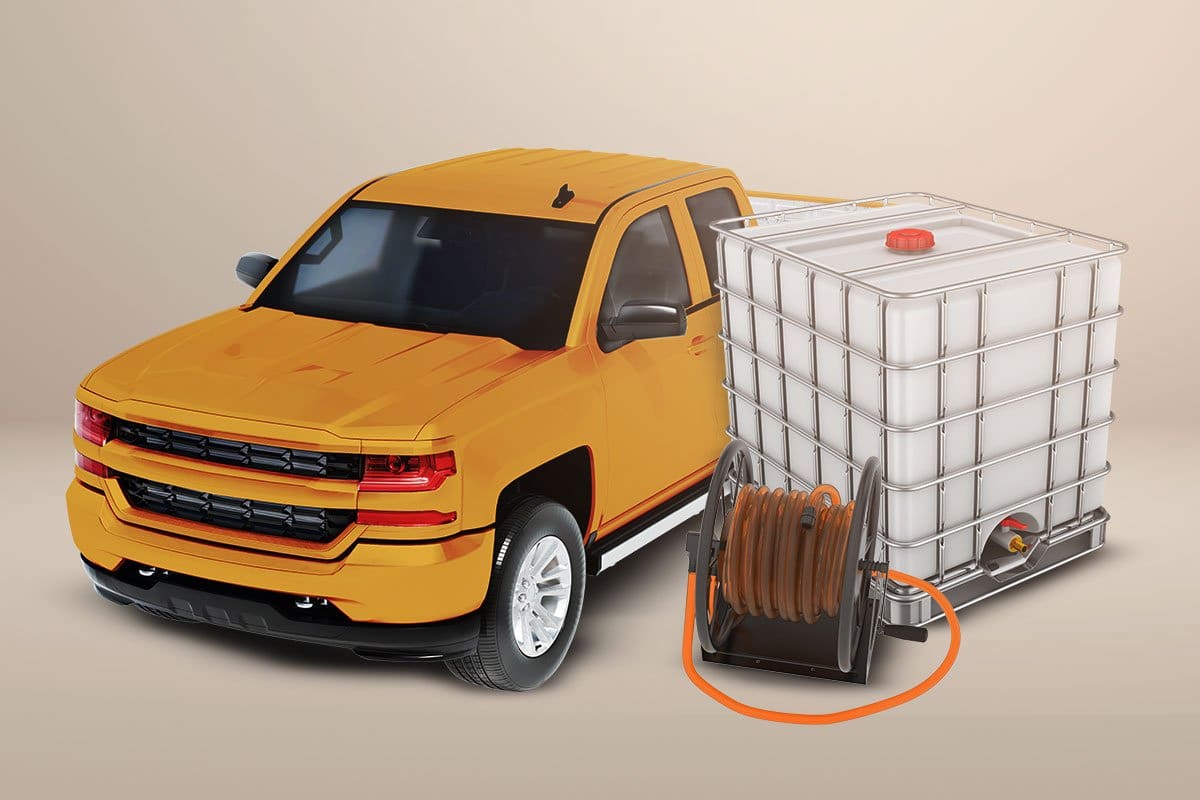
Optimize your business workflows and increase efficiency with a well-designed trailer. Customize your pressure washer trailer with features like water tanks, hose reels, and equipment mounting options to streamline your operations.
You’ll have easier access to water sources, more efficient hose management, and quicker setup and teardown. Each of these reduces downtime and improves productivity so you can take more jobs each day.
Investing in a pressure washer trailer provides flexibility for future growth and tool expansion. As your pressure washing business grows, you can easily add more equipment or upgrade your rig without worrying about storage limitations or constraints.
A power washing trailer offers the capacity and versatility to accommodate additional equipment or accessories as demand for your services increases.
It’s important to carefully assess your specific business needs, budget, and operational requirements before buying a trailer for your pressure washing rig.
Pro Tip: Measure the dimensions and weight of your machine, fuel tanks, and large water tank before choosing a pressure washer trailer.
You’ll also need to gather additional information about the capacity of the trailer, towing capacity of your vehicle, and any local regulations or permits that pertain to towing a powerwash trailer.
Next, let’s look at why Brown’s prefers a truck bed pressure washer setup.

Pressure washing trucks like the one pictured above can be a great alternative to pulling pressure washing trailers around behind your vehicles. A pressure wash truck setup serves all the same benefits as a washer trailer and has some additional advantages. You might prefer a pressure washing truck set up for these reasons:
A mobile pressure washing company will probably want to consider the pros and cons of each, but the team at Brown’s considers a truck pressure washer rig better than a power washer trailer.
Brown's Pressure Washing share their tips and strategies about how they've reached their success in out article on starting a pressure washing business. Learn more here.
Next, let’s look at what to include in a pressure washer trailer system.

Brown’s Pressure Washing uses a pressure washing truck setup that includes:
Josiah Le Beau, the Operations Manager at Brown’s Pressure Washing, told us:
[su_quote]We also add some additional technology that helps us operate our equipment through remotes which increase efficiency and an overall better cleaning for the homeowner! Everything all together cost around $23,000.[/su_quote]
Check out their custom pressure washer setup for trucks in the interview below.
Next, we discuss the elements you’ll want to include in your pressure washing rigs.
The skid frame is a sturdy and durable platform made of metal, such as steel or aluminum. It is where you mount the pressure washer components and accessories.
The skid frame design can easily be put in a truck bed or trailer for easy transportation and stability. If you have a big multi-day job you can even take it out and leave it on the job site. You can buy skids online but the closest option to Brown’s current pressure washer setup with add-ons is the Alumimax Pro Pressure Wash Skid.
Brown’s Pressure Washing recommends the 8 GPM, 3500 PSI Honda Gx690 Pressure Washer. This gas machine is the heart of their custom rig.
You might choose an electric-powered unit instead of a gas-powered washer depending on your preferences and needs. You’ll connect the pressure washer securely to the skid frame, often with vibration-dampening mounts to reduce noise and enhance its operational stability.
Learn about some of the best pressure washers for each type of cleaning job.
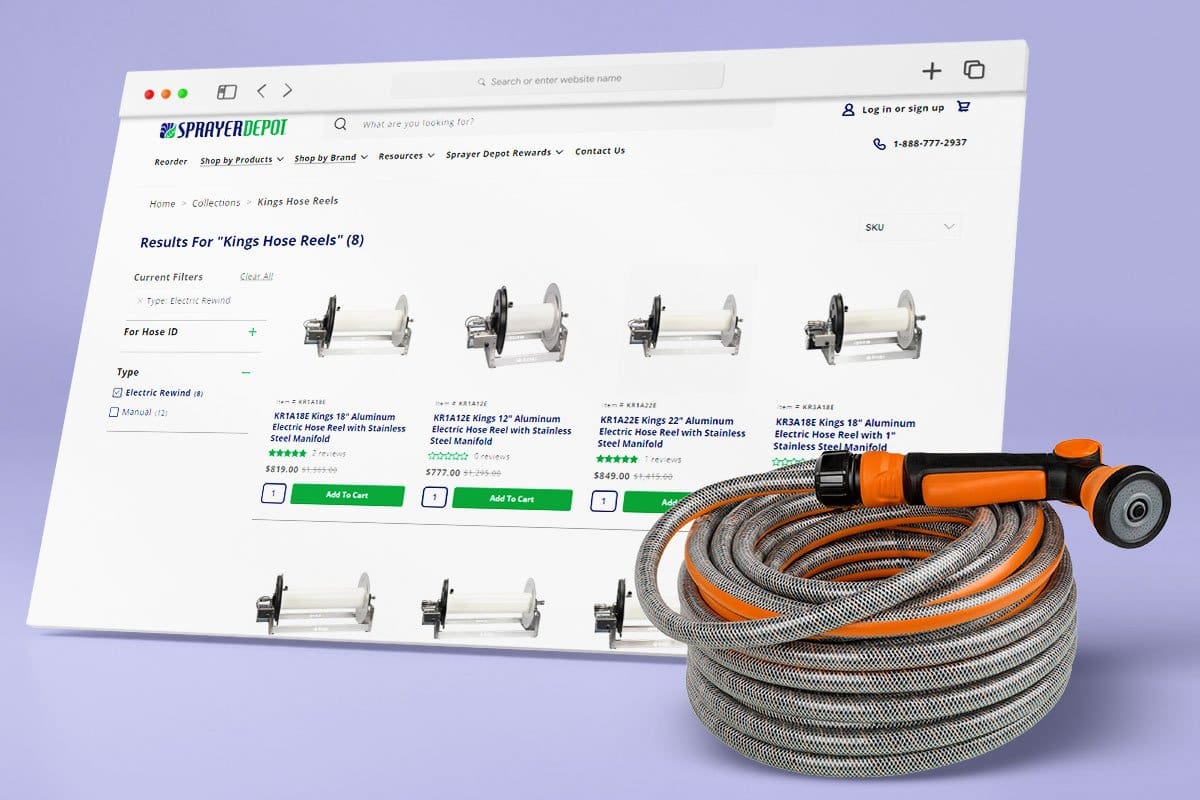
You’ll need hoses for the pressure washer to be truck or trailer-mounted. Brown’s uses three color-coded hoses on electric reels. The hoses are:
You’ll want each hose to be rated to handle a minimum of 3500 PSI (or whatever your pressure washer is rated) so that you can utilize the power washers full force on bigger jobs. Brown’s color codes their hoses and uses Kings hose reels.
You’ll notice that they have both hand crank and electrical options in the picture above.
Your power source will consist of an electrical battery or a fuel tank. If you use any electrical components with a trailer-mounted gas washer, you may need both.
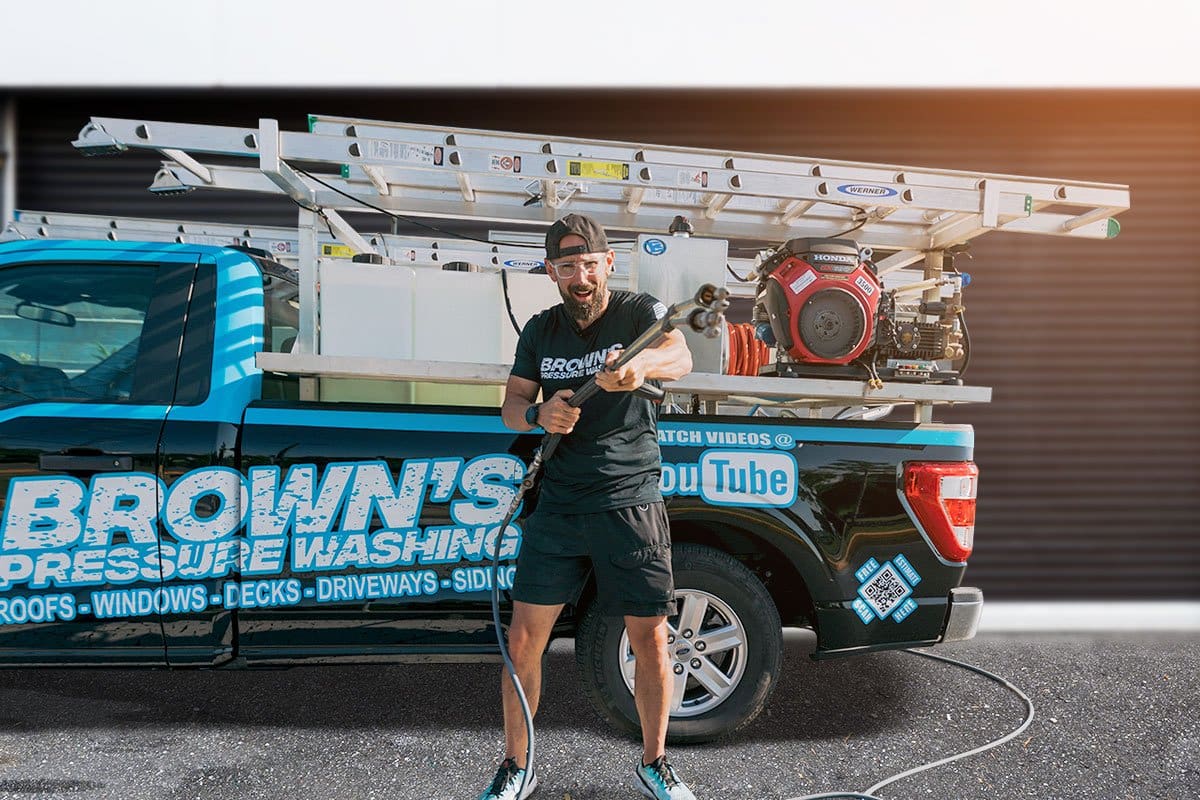
Your mobile power washer trailer will need fuel for the engine. Brown’s uses an 18-gallon fuel tank like the one in the picture below. We have provided one that appears to have similar features in our Amazon shop.
You’ll need a battery to power electric pressure washers and any other electrical equipment. Brown’s uses an Interstate deep cycle marine battery.
You’ll probably want a way to charge it, too. There are a variety of ways to charge batteries including solar, alternators, or heat reclamation turbines.

Custom pressure washer rigs often incorporate a self-contained water tank instead of connecting a hose to the water supply at the job site. The tank is securely fastened to the skid frame and may include features like baffles for stability during transport.
The team at Brown’s suggested getting a 200-gallon-capacity tank to meet the needs of most applications, including residential, business, and small industrial jobs.
You will also want a separate tank for the chemicals in your pressure washer setup. Brown’s suggests a 100-gallon chemical tank because companies will use two parts water to one part chemicals.
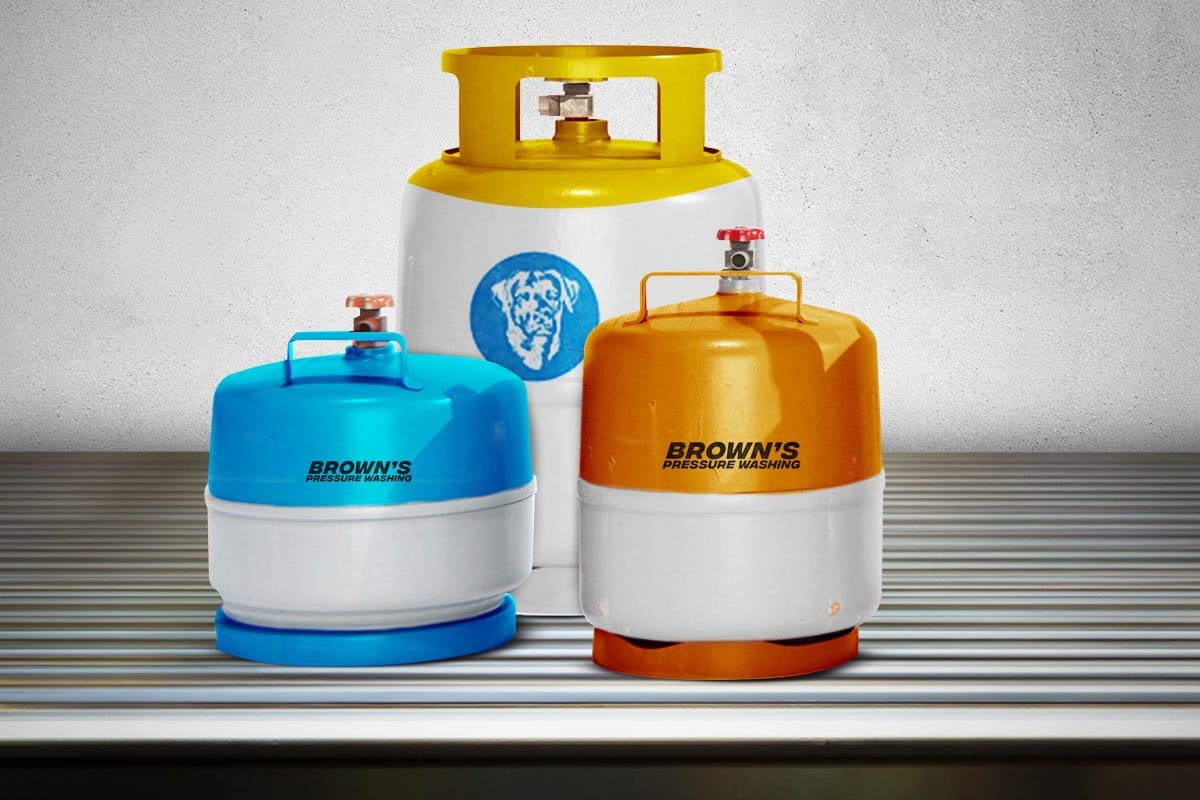
The pressure washing industry uses a lot of water. Brown’s 8 GPM setup uses as much water in 45 minutes as the average U.S. household uses in a whole day.
Reclaiming water may be required in your area, but even if it isn’t, it may reduce your long-term costs because you can filter it and reuse it.
Custom rigs on skids can be customized to include various accessories based on specific requirements. These may include surface cleaners, extension wands, nozzles, spray guns, and chemical injection systems. The accessories can be mounted on the skid frame or stored in dedicated compartments for easy access and organization.
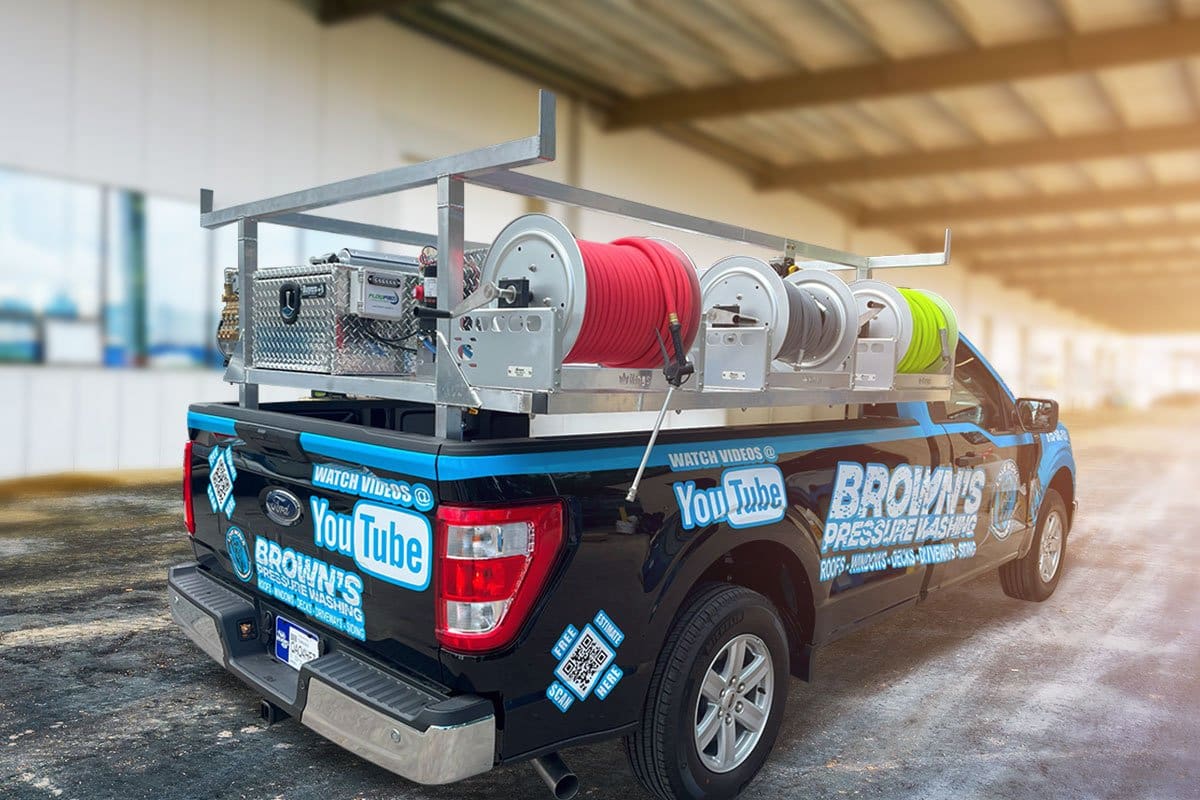
Custom rigs on skids typically include controls and safety features for convenient and safe operation. This may include pressure control valves, thermal protection, safety switches, and pressure gauges. These components ensure optimal performance, protection against overheating, and safe use of the pressure washer system.
Custom pressure washer rigs built on skids offer flexibility, portability, and efficient organization of equipment. They are commonly used in various industries such as construction, property maintenance, agriculture, and fleet cleaning, where a self-contained and transportable pressure washing system is beneficial. The customization options allow for tailoring the rig to specific needs, ensuring optimal performance and productivity on the job.
[su_note note_color="#dbeafc"]Learn everything you know about starting a pressure washing business from the amazing team at Brown's Pressure Washing. Explore this FREE masterclass to get a glimpse of what's awaiting you inside.
[/su_note]
You have two options to get your first pressure washing trailer:
Josiah told us:
[su_quote]I recommend that you start with a skid build-out for your pressure washing business. You can easily haul it in the bed of your truck, or if you don’t have a truck, you can haul it on a trailer until you get a truck that will fit it.[/su_quote]
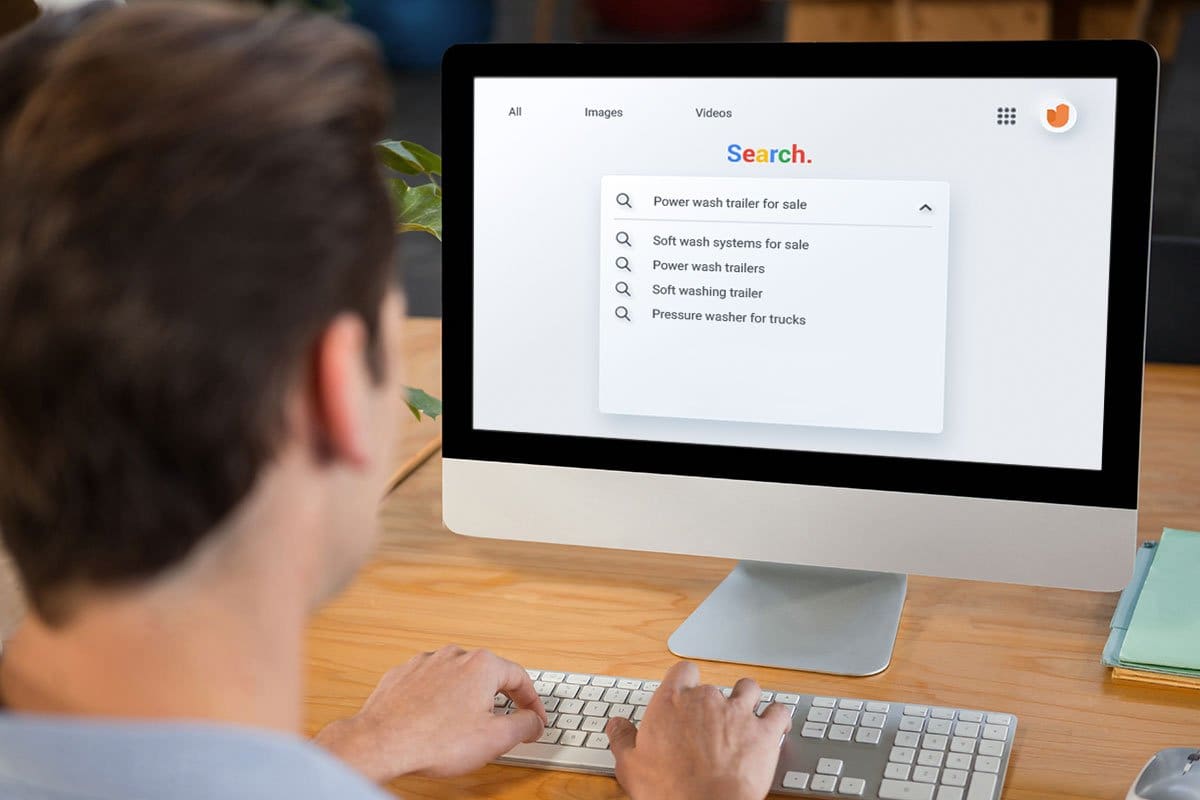
When you first start a pressure washing business, you’ll probably want to buy a commercial pressure washing setup so you can start cleaning quicker.
You can find trailers and truck systems by searching terms like:
Southeast Trailer: This company offers options for a pressure washer setup. Businesses have options ranging from $1,399 to nearly $50K.
Northern Tool: Consider pressure washing setups ranging from $300 to $20K+. You can choose from softwash systems for sale, power wash trailer setups (hot water), commercial pressure washing trailer (cold) setups, and more.
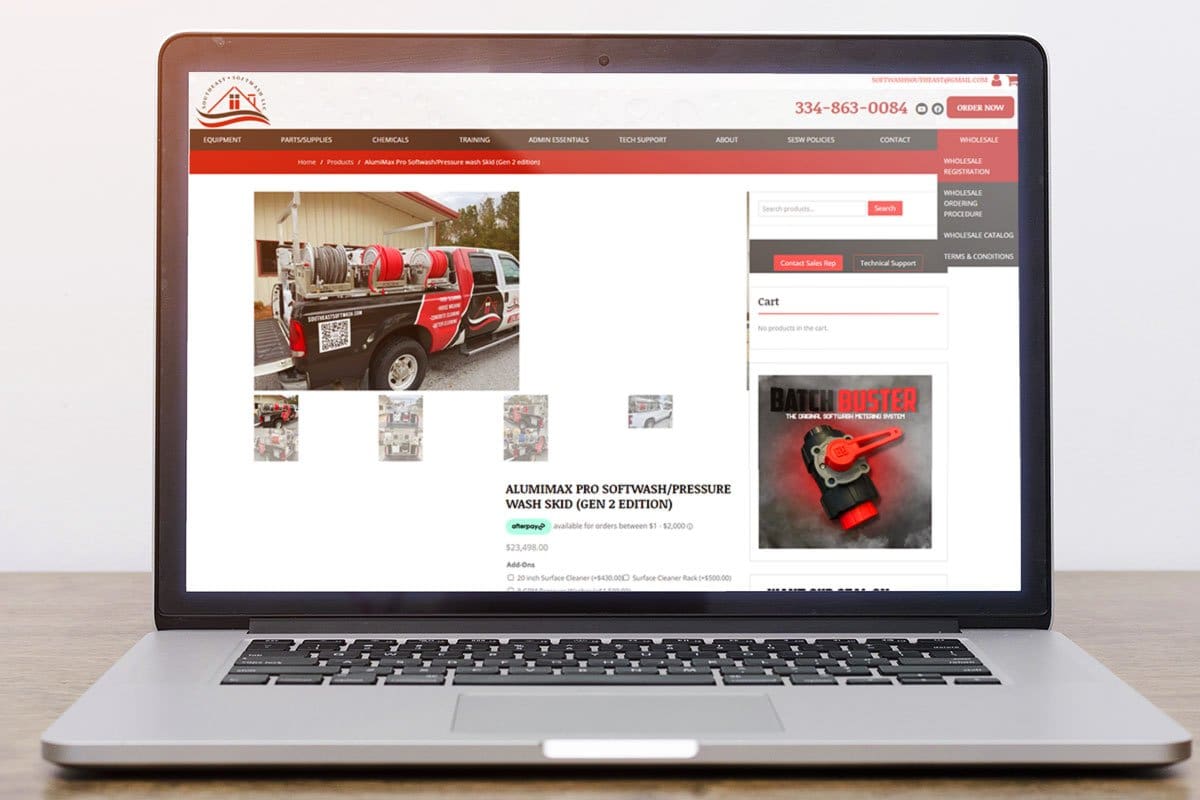
Once you develop expertise in your mobile cleaning business, it may be worth it to spend extra money on a custom wash trailer. You’ll save money by buying each piece of equipment separately, but you’ll have to perform the installation work or pay someone else to do it.
This route will require:
What you’re saving in costs, you’ll be spending in sweat equity. Based on this setup, which is comparable to Josiah’s, it appears you can buy a similar model truck power wash unit for about $7K more than it would cost to build it yourself.
While it may be cheaper, you should decide whether the $7K is worth the time it will take to build out your rig or whether it’s better to buy a truck or trailer on the open market
There are tons of options to expand your pressure washing business and improve efficiency. Making all these decision can be hard. Simplify your decision making with our Pressure Washing Class.
Will you choose a homemade trailer setup or a pre-built one? What quality and features are most important to your business?
Considering a vending machine franchise? You need to know the most lucrative program for your target market plus inside info on franchise fees and more.
We talked to Adam Hill, who started his own company, Hill Vending, which makes nearly $1M in revenue per year. He shared information on how to buy a vending business for sale. We also researched the vending machine franchise cost for some of the most popular vending machines and share all the info here.
We teach you how to pick the perfect vending franchise (and avoid scams!) so you can start making passive income ASAP.
[su_note note_color="#dbeafc"]
We’ll help you understand each of the following topics. Read it all or click a link to jump to the info that interests you most.
A vending machine franchise requires minimal investment and staff, but owning and operating a vending machine business can be perfect for entrepreneurs who want their own business that generates passive income.
A vending machine franchise comes complete with
Watch our interview with Adam to learn about starting a vending business.
[su_youtube url="https://www.youtube.com/watch?v=-s_Y-O1nosw"]Pro Tip: Check out the vending machine business course to learn how Adam launched a nearly $1 million vending business.
Adam told us:
[su_quote]I aim for $2,000+ per month from each location.[/su_quote]
As a vending machine industry business, expect 30% of your revenue to go toward wages and profits. The other 70% will go to product costs and taxes.
The more machines you own and how close they are will impact your profit margins (closer machines mean routes that are more efficient).
Next, we’ll discuss why vending machine franchise opportunities are a great strategy to use to increase your business success.
Buying a vending machine franchise opportunity is a great option for a small business owner looking for new business opportunities. The benefits of opening a vending machine franchise include:
It's important to conduct thorough research and due diligence before investing in any franchise opportunity to ensure it aligns with your goals, skills, and financial capacity. This guide will help you get started.
While doing research about vending machine franchises, I came across numerous franchise opportunities whose validity I couldn’t confirm. Unfortunately, the vending industry is ripe with scams.
Make sure to do thorough research on any vending business before contacting them. Some red flags include:
A vending machine business is a low-cost franchise with flexible hours. Find some of the best vending machine franchise opportunities.
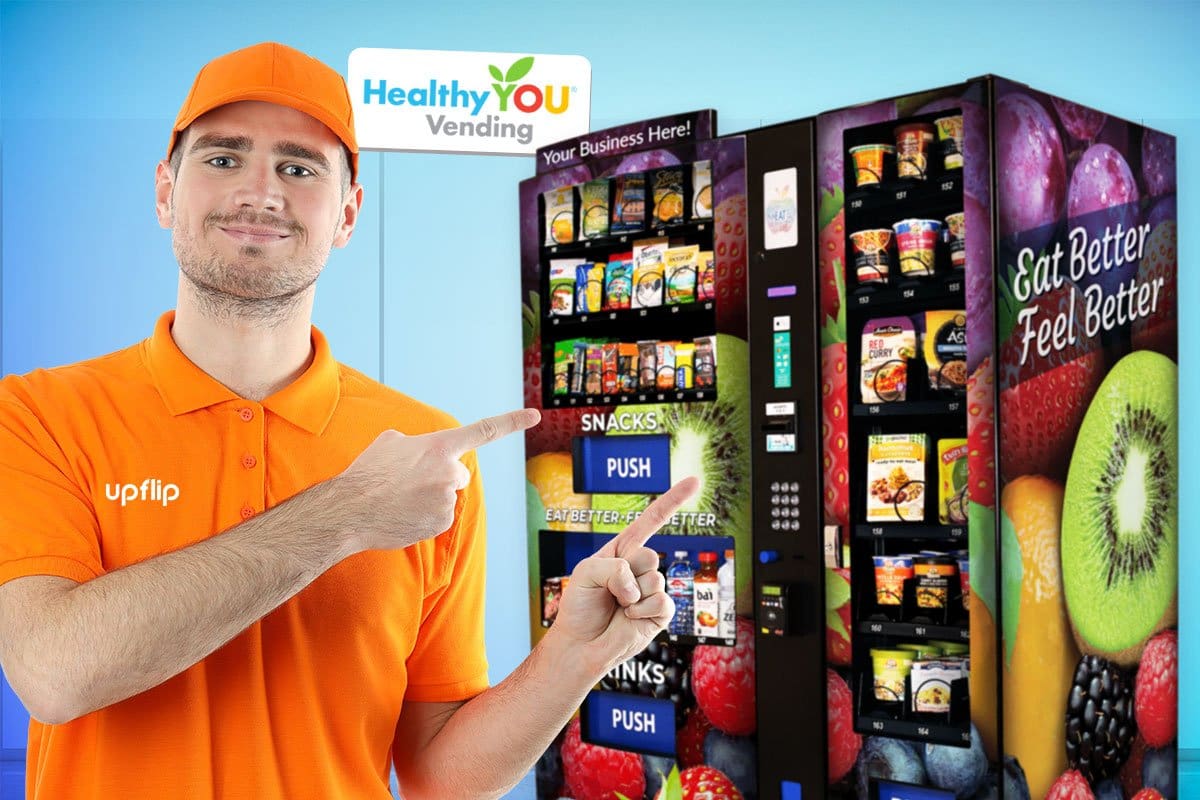
If you want to enter the healthy vending concept, consider a healthy vending machine franchise from the list below:
Get ready to start a successful healthy vending business and help health-conscious consumers snack better.
• Founded in: 2011
• Franchising since: 2011
• Franchise units: 3,000
• Initial investment: $30K-$160K
• Franchise Fee: None
• Royalty Fees: None
Healthier4U Vending was started to provide healthy food in vending machines. You can get into vending machine routes with approximately $50K. Learn more about how to buy a vending machine route from Healthier4U.
• Founded in: 1999
• Franchising since: 1999
• Franchise units: 1,800
• Initial investment: $50K-$225K
• Franchise Fee: None
• Royalty Fees: None
HealthyYOU Vending has helped more than 1,000 franchises vend healthy food and medicines in offices, gyms, and hotels. You can add a wellness (medicine) vending machine to the unit to expand your offerings in a HealthyYOU Vending machine.
Franchisees will get onboarding training, coaching, and a support center to help them make a great profit on the difference between wholesale and retail prices.
• Founded in: 1986
• Franchising since: 1987
• Franchises: 10,000
• Initial investment: $50K-$250K
• Franchise Fee: $26K
• Royalty Fees: None
Naturals2Go has been a successful vending machine company since 1987. The company helps you find places for high-tech vending machines serving healthy snacks and drinks.
• Founded in: 2020
• Franchising since: 2020
• Franchise units: Undisclosed
• Initial investment: $30K to $150K
• Franchise Fee: None
• Royalty Fees: None
Power Locker focuses on serving convenient healthy foods through their healthy vending machines. They partner with unique drink and snack brands to deliver healthy food to busy people on the go.
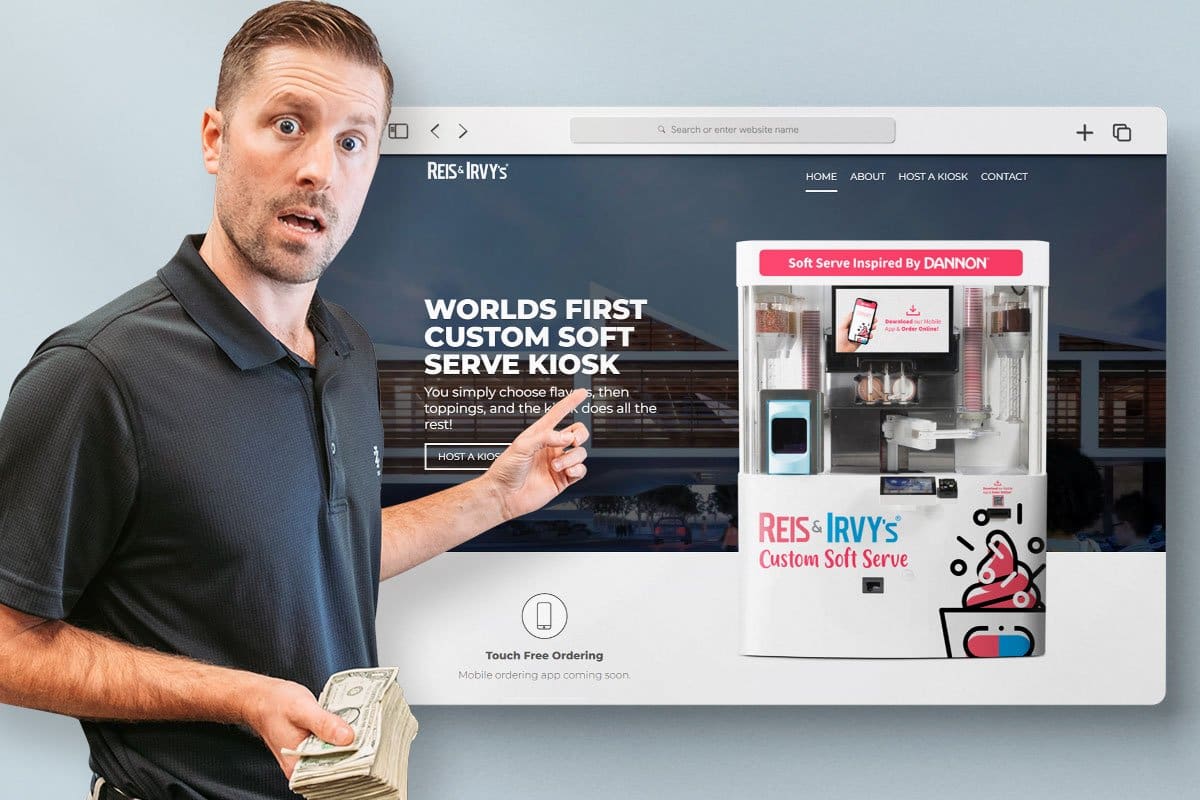
These vending opportunities focus on providing snacks consumers are familiar with and will get excited about.
• Founded in: 1988
• Franchising since: 1988
• Franchise units: 5,000
• Initial investment: $160,950 to $593,900
• Franchise Fee: $15,000 to $60,000
• Royalty Fees: 12%
Reis & Irvy’s offers a robotic frozen yogurt vending machine opportunity. For a franchise fee of $15,000 to $60,000 and a royalty fee of 12%, you can become a part of this rapidly growing industry.
The total investment for a Reis & Irvy’s franchise is $160,950 to $593,900. Some of the key requirements for this franchise opportunity include a net worth of at least $250,000 and liquid assets of $120,000.
• Founded in: 1987
• Franchising since: 1987
• Franchise units: Undisclosed
• Initial investment: $20,000
• Franchise Fee: $20,000
• Royalty Fees: N/A
UTurn helps people start and grow their own snack vending businesses. They walk you through the entire process, starting with in-person training, providing a business plan, and helping you find the best locations.

The growing ice vending niche has the potential to make real money, but the costs to start are higher than many of the other companies on this list. That said, if you want to vend water or ice, check out:
• Founded in: 2003
• Franchising since: 2003
• Franchises: 3,300
• Initial investment: $60K to $145K
• Franchise Fee: $26K
• Royalty Fees: None
The Twice the Ice opportunity is a great investment for those interested in starting their own ice and water vending enterprise. Your total investment will range from $60,000 to $135,000+, depending on the type of machine you purchase.
• Founded in: 2003
• Franchising since: 2012
• Franchise units: 4,000
• Initial investment: $111,550-$242,845
• Franchise Fee: $7,000
• Royalty Fees: 6%
Provide water and ice vending through Ice House America. Their machines run 24/7 without employees. Get unlimited earning potential when you buy a vending machine business through Ice House.
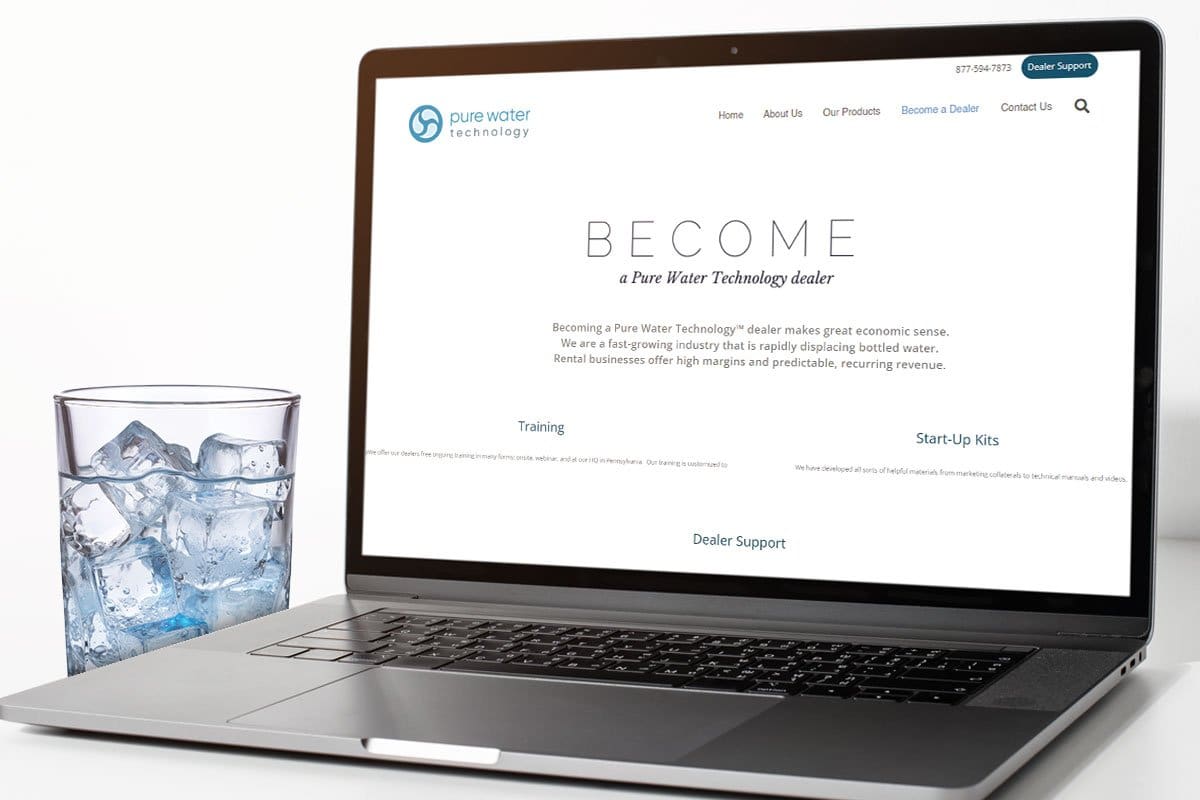
• Founded in: 1996
• Franchising since: 2014
• Franchise units: 500
• Initial investment: $50K-$100K
• Franchise Fee: $2,500
• Royalty Fees: None
Pure Water Technology was founded in 1996 because of a concern about deteriorating drinking water quality. Today it has more than 500 franchise units.
• Founded in: 1984
• Franchising since: 1994
• Franchise units: 1,301
• Initial investment: $460K
• Franchise Fee: $25K
• Royalty Fees: Up to 7%
Lani and Don Dolifka started Watermill Express because they lived near a Superfund that had unsafe drinking water. They created a purification system and encouraged reusable containers to help stay environmentally friendly.
Now, there are over 1,300 locations. All you need is a plot of land to get started.
• Founded in: 2010
• Franchising since: 2010
• Franchise units: 500
• Initial investment: $25K-$400K
• Franchise Fee: $25K
• Royalty Fees: Up to 7%
Water Station Technology focuses on providing tech to make water vending more efficient. Join the most innovative company in water vending.
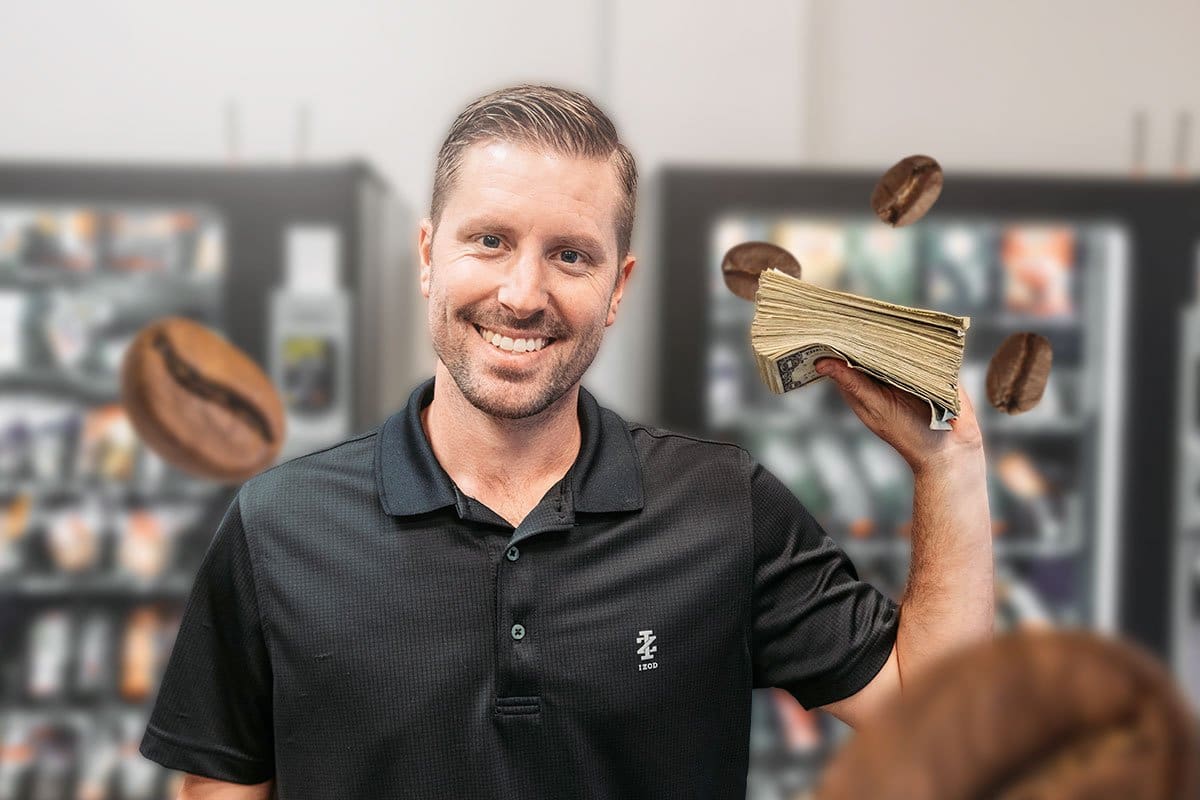
• Founded in: 2003
• Franchising since: 2004
• Franchise units: 180
• Initial investment: $$67,900-$115,000
• Franchise Fee: $37,500
• Royalty Fees: $0.11-$0.15 per cup
Xpresso Delight was started in 2004 to provide coffee vending in the U.S., Australia, and New Zealand. These vending solutions target office break rooms and charge businesses based on per-cup pricing. Learn more about the Xpresso Delight franchising.
These vending machine franchises span industries from healthcare to clothes bins and CBD.
• Founded in: 2014
• Franchising since: 2018
• Franchise units: 47
• Initial investment: $195,700-$216,800
• Franchise Fee: $36K
• Royalty Fees: 6%
The automated pharmacy, Pharmabox carries 140 of the top-selling over-the-counter (OTC) medications. They help with securing a vending machine location and even provide the products to you at wholesale pricing.
You’ll get access to:
The vending machine routes for sale are on the pricier side of vending machine franchises, but any retail store or pharmacy that doesn’t have one outside needs a Pharmabox franchise.
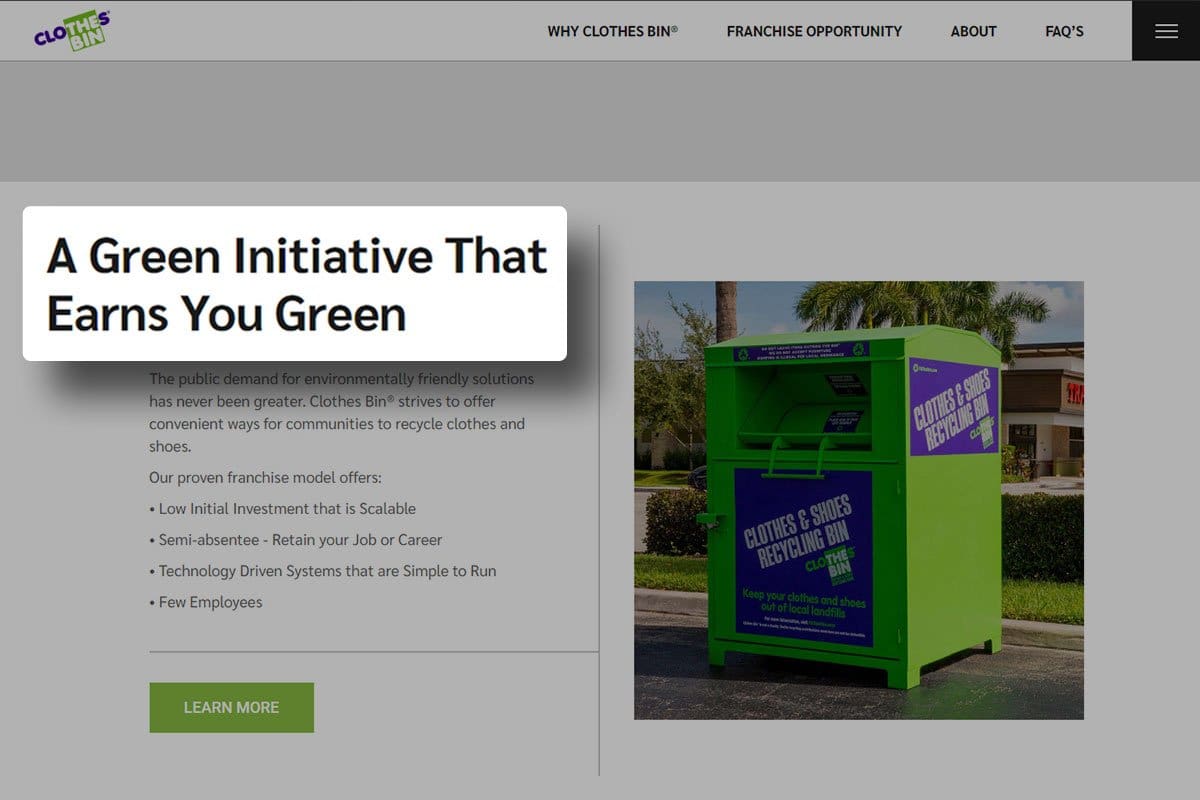
• Founded in: 2014
• Franchising since: 2015
• Franchise units: 38
• Initial investment: $129K-$186K
• Franchise Fee: $40,000
• Royalty Fees: $6 per bin, per week
Clothes Bin franchises place clothing bins on site that encourage people to recycle their clothing. When the bin is full, you pick it up and ship it to their sorters, who sell the clothes or repurpose them. Learn more about Clothes Bin.
• Founded in: 2021
• Franchising since: 2021
• Franchise units: 2,600
• Initial investment: $6.5K-$10K
• Franchise Fee: N/A
• Royalty Fees: Not Disclosed
ATM Together is an ATM automation service that helps people find profitable locations, provides cash and Bitcoin ATMs, and connects you with the vendors you need for ATMs. Check out our blog and interview with the owner below.
Other ATM franchises to consider include:
• Founded in: 2014
• Franchising since: 2014
• Franchise units: Undisclosed
• Initial investment: $55K
• Franchise Fee: $55K
• Royalty Fees: Undisclosed
CBD is a chemical extracted from cannabis that helps with anxiety, pain relief, sleep, stress, and other ailments. CBD Vending claims franchises make up to $50K profit annually in residual income.
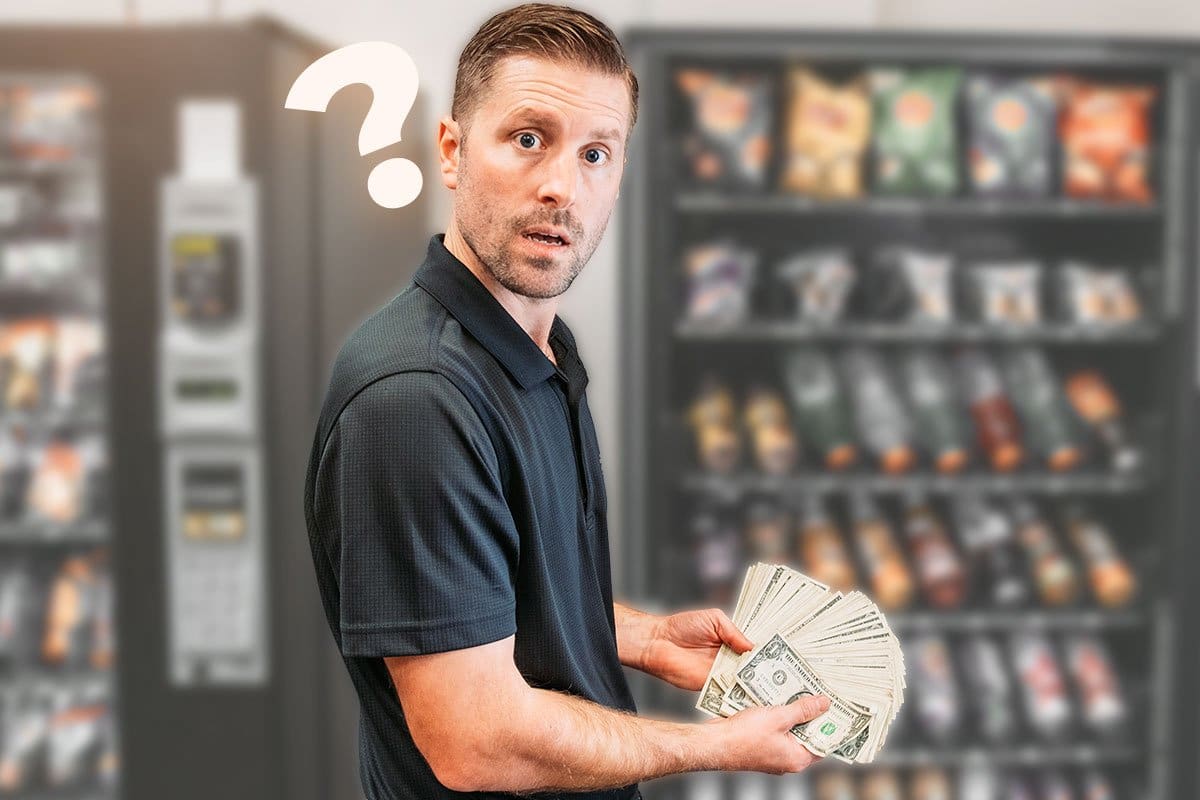
Before you go into business with any vending machine franchise opportunity, you’ll want to verify:
Check reviews, talk to other franchisees, and make sure the vending machine franchise has a good reputation. You don’t want to spend a lot of money on vending machine locations for sale just to find out there’s no traffic at the location.
Franchising is a great business model, but the processes set forth by the franchisor impact franchisee success. Ask for average earning documentation and franchisee satisfaction statistics. Any reputable franchise should have these in their franchise disclosure documents. Learn how to buy a franchise.
A successful vending machine business will normally make enough that every machine can buy another machine each year. If the franchise model is expensive enough that you can’t buy at least another franchise vending machine annually, you’ll have a hard time maximizing profits.
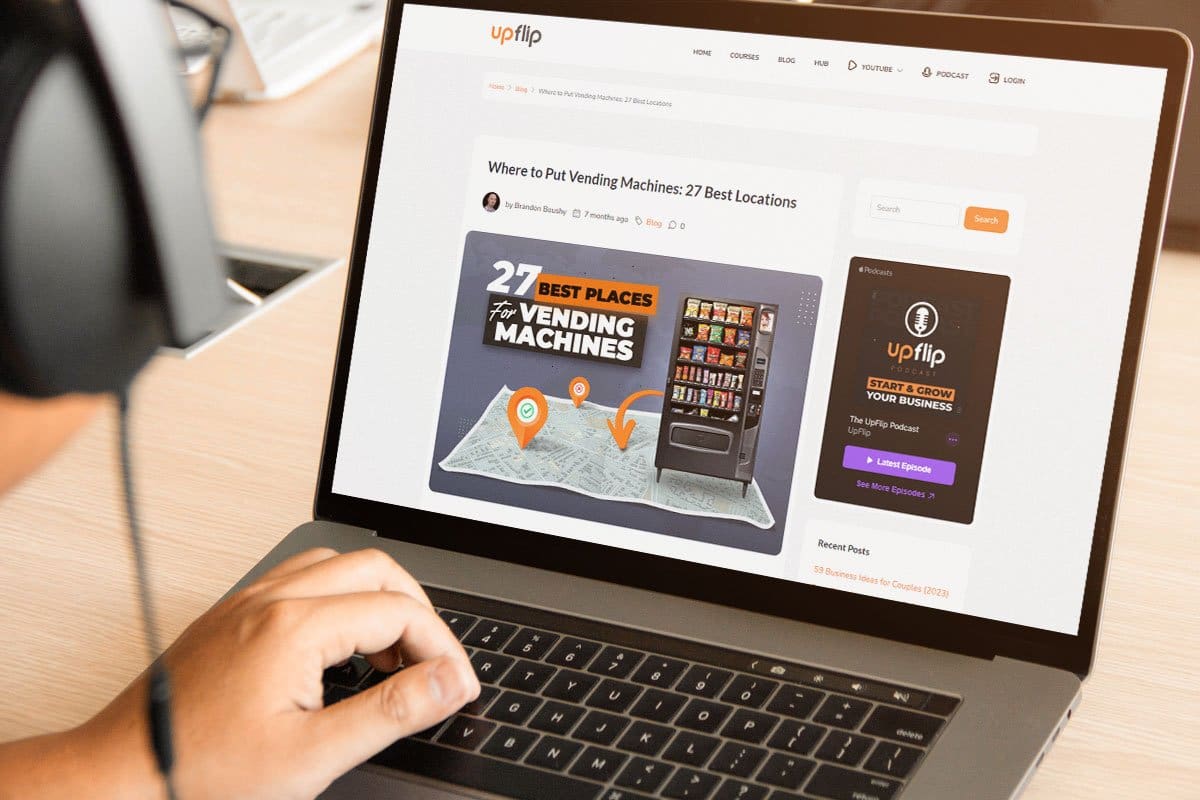
The vending machine’s location will impact your success. Look for a location with high visibility and good foot traffic. Learn how to place a vending machine.
Opening a franchise will cost different amounts based on the franchisor you choose and your location. Some franchises require an investment of only $7K, while others may cost more than $250K. Ask the franchisor about royalty fees and advertising expenses to accurately estimate your startup costs and potential profits.
When you buy a vending machine franchise, you should be looking for ones that return your investment capital in a year. Adam Hill told us that you should make at least 50 cents profit on each item sold and that he aims to make at least $2,000 monthly from each vending machine.
You should follow the steps below to start a vending company:
Check out our vending machine business course for more information.

You can buy vending machines for between $50 and $20,000 depending on the type of vending machine, technology integration, and condition of the machine.
When you want to find a vending machine route for sale, you’ll normally pay more because the vending machine business for sale already has revenue, which makes it more valuable.
To start a vending machine business, you should expect to pay at least $3,000, which includes:
The more machines you buy, the more you should expect to spend. Depending on your business goals and the business opportunity, you may spend up to $250K when buying vending machine routes.
We’ve covered where to buy vending machine franchise options. You should consider whether a vending machine franchise for sale seems legit. Scams are increasing along with people’s growing awareness of passive income and ability to control their own schedules.
Despite the hustlers trying to pull one over on people, vending machines can be a profitable source of passive income.
What vending machine business interests you?
i found the information very useful, and i hope it will guide me way much better since i am starting afresh . thank you
 Inbox
Inbox 
Learn from business failures and successes in 5 min or less. The stories, frameworks, and tactics that will make you a 10x better founder.
 Join our 45,000+ entrepreneurs
Join our 45,000+ entrepreneurs